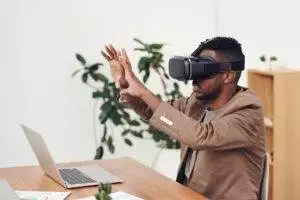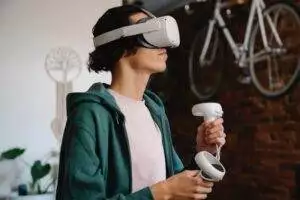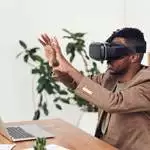The landscape of education, particularly in college settings, is continuously evolving with advancements in technology. Among these, Virtual Reality (VR) is emerging as a transformative tool for enhancing experiential learning. This innovative technology is not just a futuristic concept but a practical tool that’s already finding its way into classrooms and online courses, changing the way students interact with their coursework.

While students today juggle their busy schedules, from handling complex assignments to engaging in diverse learning activities, the advent of VR in education offers a refreshing and immersive learning experience. Just as students might seek out services to buy custom essay for academic assistance, VR provides an alternative and engaging method of learning that goes beyond traditional textbooks and lectures.
Real-World Applications of VR in Education
Enhancing Soft Skills and Communication
The application of VR in higher education goes beyond conventional teaching methods by focusing on critical soft skills essential for the modern workplace. Universities are increasingly adopting VR tools like VirtualSpeech to offer students a dynamic platform for honing communication skills. This immersive technology allows for realistic scenarios where students can practice public speaking, negotiation, and other interpersonal skills in a controlled environment.
The real-time feedback mechanism, including detailed speech analysis, is a revolutionary way for students to understand and improve their verbal and non-verbal communication. Moreover, the interaction with AI-powered virtual characters in VR settings provides a unique opportunity for students to test and refine their skills in diverse scenarios, from job interviews to complex group discussions.
Immersive Learning Experiences

Institutions like Arizona State University and ESADE Business School are at the forefront of integrating VR into their curricula to provide immersive learning experiences. At Arizona State University, biology students are engaging in VR modules that include interactive elements such as hand tracking and haptic feedback, leading to increased engagement and improved academic performance. Similarly, ESADE is leveraging VR to enhance students’ practical skills, crucial for their future careers. These VR experiences are not just about visual immersion. They include multisensory elements that make learning more engaging and effective.
Virtual Field Trips and Global Learning
The concept of virtual field trips, facilitated by VR, is transforming the idea of global learning. Students can now visit remote or historically significant locations from their classrooms, breaking the geographical barriers to learning. Schools like Schaumburg School District 54 in Illinois are utilizing VR kits for educational journeys to places like the moon, allowing students a firsthand experience of space exploration. These virtual excursions are not just visually stimulating but are packed with educational content, making learning a thrilling adventure.
Preparing for the Workplace
The integration of VR in university curriculums is a strategic move to prepare students for the evolving job market, especially in fields where VR and AR are becoming increasingly prevalent. VR labs are being set up worldwide to equip students with practical skills in these emerging technologies. This trend is in response to the growing demand in the job market for VR/AR expertise, as evidenced by a significant increase in the hiring of VR/AR engineers. By familiarizing students with VR technology, universities are ensuring that their graduates are not only knowledgeable but also ready for future technological advancements.
Challenges and Considerations

Accessibility and Physical Space
While VR opens up new dimensions in learning, it brings its own set of challenges. The requirement for high-powered computing equipment, ample physical space for movement, and the need to accommodate users with visual impairments are some of the logistical considerations. This necessitates a rethinking of traditional classroom setups to make them VR-friendly. Ensuring that the VR experience is inclusive and accessible to all students is paramount in its successful integration into the education system.
Content Development
Developing relevant and diverse VR content tailored to different educational disciplines remains a challenge. Institutions like the University of Illinois College of Medicine are addressing this by creating their own VR lectures, catering to the specific needs of their curriculum. This proactive approach in content development is vital to fully realize the potential of VR in education, ensuring that it serves a broad spectrum of academic subjects and learning objectives.
Technological Literacy and Training
Incorporating VR into education also requires a focus on technological literacy and training for both students and educators. Educators need to be trained not only in the technical aspects of operating VR equipment but also in integrating VR experiences effectively into their teaching methods. Similarly, students need to be equipped with the skills to navigate and utilize VR technology efficiently. This encompasses understanding the operational aspects of VR hardware and software, as well as developing the ability to engage with and learn from VR content. Providing comprehensive training and support for all users is essential for maximizing the educational benefits of VR technology.
Conclusion
VR in education represents a significant shift toward more engaging and immersive learning experiences. It provides students with unique opportunities to explore, interact, and learn in ways that were previously impossible. As the technology becomes more accessible and its applications more diverse, VR is poised to become an integral part of the educational landscape. For students seeking innovative ways to enhance their learning experiences, remember that the best paper writing service is always there to support their academic writing needs, complementing the immersive and interactive learning that VR provides.
